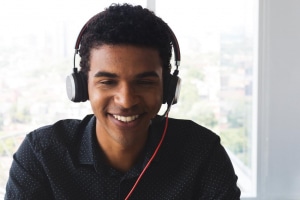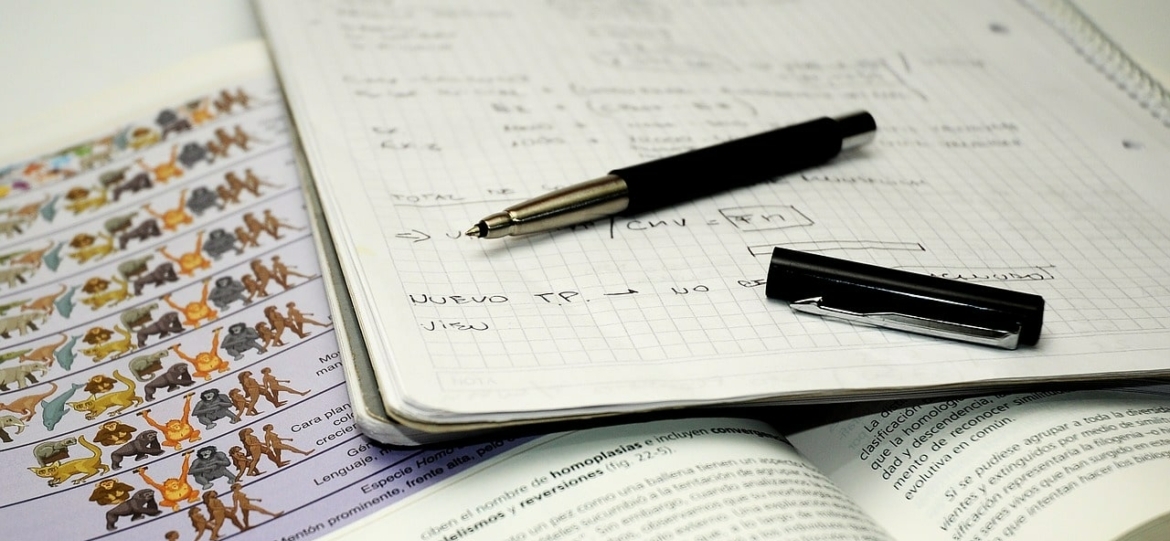La parte Listening C1 Cambridge es la tercera parte del C1 Advanced despues del Writing. Esta parte consiste en escuchar una entrevista o discusión que dura entre 3 y 4 minutos. El objetivo de esta sección es medir tu capacidad para escuchar grabaciones más extensas y captar las actitudes, opiniones, sentimientos, acuerdos, etc. de los participantes.
Con la ayuda de este artículo podrás encontrar:
- Ejemplo del CAE listening part 3
- Consejos para esta parte
- Prepárate para el CAE con GlobalExam
¡Vamos a leerlo!
Ejemplo y preguntas para el CAE Listening part 3
Antes de todo, no olvides que para aprobar un examen, lo que tienes que hacer son ejercicios, y nosotros te ponemos a disposición exámenes C1 Cambridge gratis para practicar.
Para el CAE listening part 3, las preguntas son de selección múltiple y el audio se reproduce 2 veces. A continuación, te mostramos la transcripción del audio junto con sus respectivas preguntas. Recuerda que, durante el examen, no tendrás ninguna transcripción.
Si quieres prepararte para esta sección en condiciones reales, no dudes en inscribirte en nuestra plataforma. Encontrarás muchos ejercicios sobre la parte 3 del listening asi como de las otras partes.
Instrucción: You will hear an interview with two students who have just completed a gap year. Choose the answer (A, B, C or D) which fits best according to what you hear. You now have 70 seconds to look at this part.
M1 (Interviewer) – Good afternoon, ladies and gentlemen, and welcome to our discussion corner, here at WCEJ News. I’m here today to talk to two students in Manchester, in the UK, who’ve just completed a gap year. Michael, Joanna, welcome to the show.
M2 (Michael) – Nice to be here.
W (Joanna) – Indeed it is.
M1 (Interviewer) – Indeed. So, I understand that both of you recently took a year out to work on some personal projects. Let’s talk to Michael first of all. So, Michael…what made you decide to take this time off?
M2 (Michael) – Well, I’ve been in full time education for… let’s see, how long is it? About seventeen years, all told. It can get a little stale sometimes, I’ve found. Going in every day for eight hours, then homework, projects, assignments, constant reviewing… there are only so many years of that you can do before your brain starts to rebel a little. So, I took a year out before I started my Master’s degree to travel around India and South America.
M1 (Interviewer) – I see. Sounds exciting. Was it everything you hoped it would be?
M2 (Michael) – I’ll say! It can be pretty easy to forget, when you’re cooped up in a classroom from morning to night and constantly swotting for whatever test is lurking on the horizon, that there’s a big world out there and a lot of things to see. I went to India to do some volunteer work at a local hospital; my field of study is biomedical science, and in the more rural parts of the country they’re in dire need of that kind of expertise. Then I went hiking in Peru, Bolivia and Ecuador.
W (Joanna) – Wow, so cool. I’ve always wanted to go there!
M2 (Michael) – Me too. That’s actually why I went- I’ve been fascinated by the Incas since I was a boy. Plus, South America is one of those places that not many people get to visit in their lifetimes, so it’s always good to do something different. And the local cuisine is supposed to be pretty great, too.
M1 (Interviewer) – Sounds great! Let’s bring in Joanna to talk about her experiences. Joanna, what did you do with your gap year?
W (Joanna) – Well, my situation is a little different to Michael’s- I’m studying to be a trauma surgeon, and we’re encouraged as part of our studies to spend some time pract
icing medicine abroad, to get a better feel for how impoverished countries offer treatment. I worked with Doctors Without Borders in Chad.
M1 (Interviewer) – In Africa, right?
W (Joanna) – That’s right. It’s in the centre of Africa, between Niger and the Sudan. For geographical reasons, this part of the world is lacking a lot of resources, including trained medical personnel, so DWB does a lot of work there, helping to train the locals and providing patient care for the more HIV-stricken and impoverished areas. We were warned about some of what we would see, but nothing can fully prepare you for what’s out there. It was a pretty humbling experience. We take our healthcare system for granted, in Europe, and we really shouldn’t. Ours have huge amounts of money invested in them, whereas most healthcare systems in that part of Africa have to make do on a shoestring.
M1 (Interviewer) – So, all of that sounds wonderful. Do you have any regrets about taking a year off?
W (Joanna) – None for me, although I did get a pretty grim stomach infection on the trip. I was out of action for a few weeks, but I persevered.
M2 (Michael) – I just wish it had been longer!
M1 (Interviewer) – Michael, Joanna, thank you both so much for coming. It’s quarter past the hour now, so time to check in with……

Pregunta 1:
What was Michael’s motivation for taking a year off?
A. He was fed up with school.
B. He wanted to travel around South-East Asia.
C. He wanted to help in South America.
D. He didn’t like studying biomedical science.
Pregunta 2:
Michael went to India because
A. he studies biomedical science.
B. rural parts of the country are better to visit.
C. parts of the country badly needed his skill-set.
D. he wanted to go hiking there.
Pregunta 3:
Michael chose those three South American countries to
A.hike in as many different countries as possible.
B.satisfy a curiosity he has had since childhood.
C.see the Incas.
D.prove to his friends that South American cuisine is great.
Pregunta 4
Why did Joanna want to do a year abroad?
A.bcause it is a compulsory part of her studies
B.because she wanted to go to Chad
C.because she was encouraged to by her professors
D.because Africa is a good place to learn surgery
Pregunta 5
Which of these most accurately describes DWB’s mission in Chad?
A.offering medical training for local personnel and drugs for HIV patients
B.offering HIV drugs and other materiel to the local healthcare industry
C.offering training to local personnel from doctors who specialise in HIV
D.offering training to local personnel and care for the most at-risk populations
Pregunta 6
What does Joanna imply about the healthcare industry in Chad?
A.It is very underfunded.
B.It is a humbling experience.
C.It is comparable in quality to that of Europe.
D.It fails many of its patients.
Consejos para tener éxito en la parte 3 del Listening
- Enfoca tu atención en las claves lingüísticas que te permitirán interpretar las actitudes de los hablantes. Por ejemplo: Concéntrate en la acentuación y la entonación pues ambas subrayan diferencias en el significado de lo que se dice.

- Si temes perderte en el flujo de información, dale prelación a la lectura de las preguntas (y no a las proposiciones que las conforman).
- No olvides que aquí no se pone a prueba tan solo la comprensión del intercambio entre los hablantes, sino además los elementos no dichos, es decir, tácitos en el diálogo.
- Sintoniza la radio, podcasts o programas online y escucha regularmente este tipo de intercambios. Pregúntate quién piensa qué, qué sienten, quiénes están de acuerdo, etc.
- Para evitar caer en incongruencias, trabaja el vocabulario típico de entrevistas. Por ejemplo, expresión de opiniones, arrepentimiento, descripción de actitudes, etc.
¡Prepárate para el CAE con GlobalExam!
Nosotros te ayudamos en tu preparación para los certificados de idiomas. Con GlobalExam dispondrás de varios ejercicios, simulacros de examen, seguimiento personalizado, fichas de vocabulario, fichas de gramática y mucho más.
¿Te preguntas si también te ayudamos en tu preparación para el CAE? ¡Claro que si! Con nosotros podrás prepararte para cada sección del C1 Advanced sin nigún problema. En la parte del Listening podrás escuchar diferentes audios, de acuerdo a la parte que quieras entrenarte (CAE Listening part 1, la CAE Listening part 2 , part 3 y la CAE Listening part 4) y luego tendrás una explicación de la respuesta correcta si en caso lo necesites.
¿Estás lista(o)? ¡Inscríbete, es gratis !



